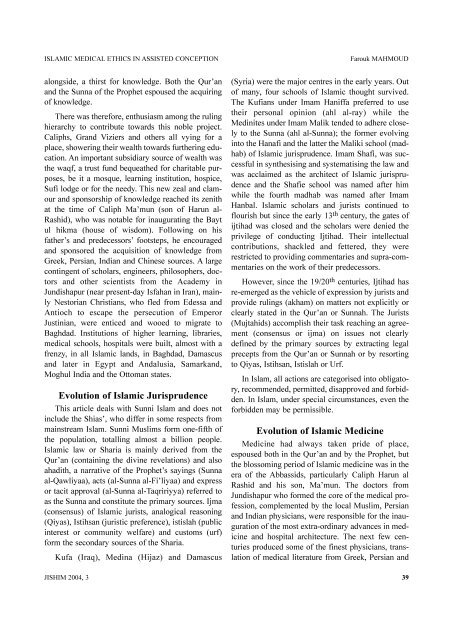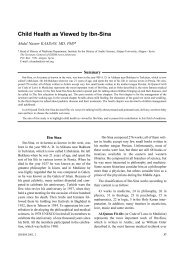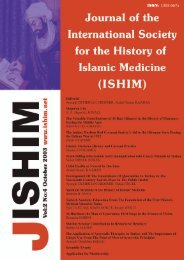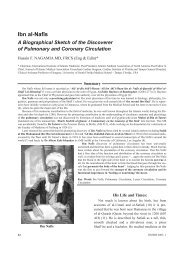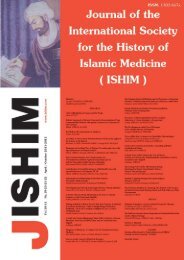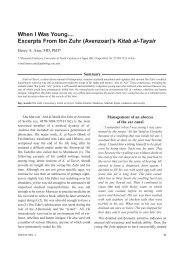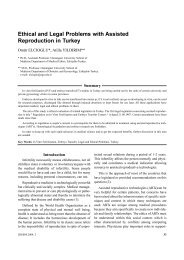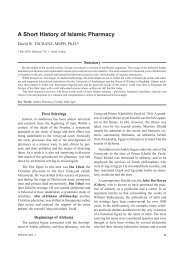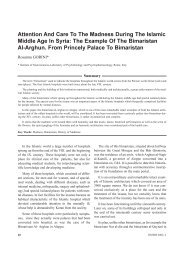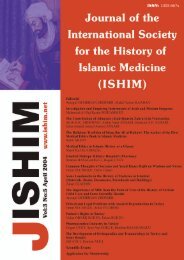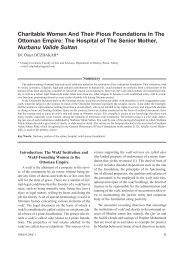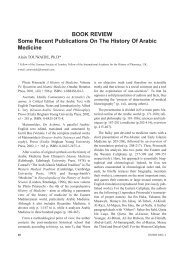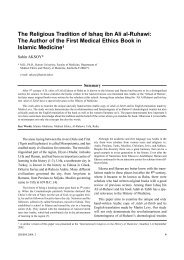Journal - International Society for the History of Islamic Medicine
Journal - International Society for the History of Islamic Medicine
Journal - International Society for the History of Islamic Medicine
You also want an ePaper? Increase the reach of your titles
YUMPU automatically turns print PDFs into web optimized ePapers that Google loves.
ISLAMIC MEDICAL ETHICS IN ASSISTED CONCEPTION<br />
alongside, a thirst <strong>for</strong> knowledge. Both <strong>the</strong> Qur’an<br />
and <strong>the</strong> Sunna <strong>of</strong> <strong>the</strong> Prophet espoused <strong>the</strong> acquiring<br />
<strong>of</strong> knowledge.<br />
There was <strong>the</strong>re<strong>for</strong>e, enthusiasm among <strong>the</strong> ruling<br />
hierarchy to contribute towards this noble project.<br />
Caliphs, Grand Viziers and o<strong>the</strong>rs all vying <strong>for</strong> a<br />
place, showering <strong>the</strong>ir wealth towards fur<strong>the</strong>ring education.<br />
An important subsidiary source <strong>of</strong> wealth was<br />
<strong>the</strong> waqf, a trust fund bequea<strong>the</strong>d <strong>for</strong> charitable purposes,<br />
be it a mosque, learning institution, hospice,<br />
Sufi lodge or <strong>for</strong> <strong>the</strong> needy. This new zeal and clamour<br />
and sponsorship <strong>of</strong> knowledge reached its zenith<br />
at <strong>the</strong> time <strong>of</strong> Caliph Ma’mun (son <strong>of</strong> Harun al-<br />
Rashid), who was notable <strong>for</strong> inaugurating <strong>the</strong> Bayt<br />
ul hikma (house <strong>of</strong> wisdom). Following on his<br />
fa<strong>the</strong>r’s and predecessors’ footsteps, he encouraged<br />
and sponsored <strong>the</strong> acquisition <strong>of</strong> knowledge from<br />
Greek, Persian, Indian and Chinese sources. A large<br />
contingent <strong>of</strong> scholars, engineers, philosophers, doctors<br />
and o<strong>the</strong>r scientists from <strong>the</strong> Academy in<br />
Jundishapur (near present-day Isfahan in Iran), mainly<br />
Nestorian Christians, who fled from Edessa and<br />
Antioch to escape <strong>the</strong> persecution <strong>of</strong> Emperor<br />
Justinian, were enticed and wooed to migrate to<br />
Baghdad. Institutions <strong>of</strong> higher learning, libraries,<br />
medical schools, hospitals were built, almost with a<br />
frenzy, in all <strong>Islamic</strong> lands, in Baghdad, Damascus<br />
and later in Egypt and Andalusia, Samarkand,<br />
Moghul India and <strong>the</strong> Ottoman states.<br />
Evolution <strong>of</strong> <strong>Islamic</strong> Jurisprudence<br />
This article deals with Sunni Islam and does not<br />
include <strong>the</strong> Shias’, who differ in some respects from<br />
mainstream Islam. Sunni Muslims <strong>for</strong>m one-fifth <strong>of</strong><br />
<strong>the</strong> population, totalling almost a billion people.<br />
<strong>Islamic</strong> law or Sharia is mainly derived from <strong>the</strong><br />
Qur’an (containing <strong>the</strong> divine revelations) and also<br />
ahadith, a narrative <strong>of</strong> <strong>the</strong> Prophet’s sayings (Sunna<br />
al-Qawliyaa), acts (al-Sunna al-Fi’liyaa) and express<br />
or tacit approval (al-Sunna al-Taqririyya) referred to<br />
as <strong>the</strong> Sunna and constitute <strong>the</strong> primary sources. Ijma<br />
(consensus) <strong>of</strong> <strong>Islamic</strong> jurists, analogical reasoning<br />
(Qiyas), Istihsan (juristic preference), istislah (public<br />
interest or community welfare) and customs (urf)<br />
<strong>for</strong>m <strong>the</strong> secondary sources <strong>of</strong> <strong>the</strong> Sharia.<br />
Kufa (Iraq), Medina (Hijaz) and Damascus<br />
JISHIM 2004, 3<br />
Farouk MAHMOUD<br />
(Syria) were <strong>the</strong> major centres in <strong>the</strong> early years. Out<br />
<strong>of</strong> many, four schools <strong>of</strong> <strong>Islamic</strong> thought survived.<br />
The Kufians under Imam Haniffa preferred to use<br />
<strong>the</strong>ir personal opinion (ahl al-ray) while <strong>the</strong><br />
Medinites under Imam Malik tended to adhere closely<br />
to <strong>the</strong> Sunna (ahl al-Sunna); <strong>the</strong> <strong>for</strong>mer evolving<br />
into <strong>the</strong> Hanafi and <strong>the</strong> latter <strong>the</strong> Maliki school (madhab)<br />
<strong>of</strong> <strong>Islamic</strong> jurisprudence. Imam Shafi, was successful<br />
in syn<strong>the</strong>sising and systematising <strong>the</strong> law and<br />
was acclaimed as <strong>the</strong> architect <strong>of</strong> <strong>Islamic</strong> jurisprudence<br />
and <strong>the</strong> Shafie school was named after him<br />
while <strong>the</strong> fourth madhab was named after Imam<br />
Hanbal. <strong>Islamic</strong> scholars and jurists continued to<br />
flourish but since <strong>the</strong> early 13th century, <strong>the</strong> gates <strong>of</strong><br />
ijtihad was closed and <strong>the</strong> scholars were denied <strong>the</strong><br />
privilege <strong>of</strong> conducting Ijtihad. Their intellectual<br />
contributions, shackled and fettered, <strong>the</strong>y were<br />
restricted to providing commentaries and supra-commentaries<br />
on <strong>the</strong> work <strong>of</strong> <strong>the</strong>ir predecessors.<br />
However, since <strong>the</strong> 19/20th centuries, Ijtihad has<br />
re-emerged as <strong>the</strong> vehicle <strong>of</strong> expression by jurists and<br />
provide rulings (akham) on matters not explicitly or<br />
clearly stated in <strong>the</strong> Qur’an or Sunnah. The Jurists<br />
(Mujtahids) accomplish <strong>the</strong>ir task reaching an agreement<br />
(consensus or ijma) on issues not clearly<br />
defined by <strong>the</strong> primary sources by extracting legal<br />
precepts from <strong>the</strong> Qur’an or Sunnah or by resorting<br />
to Qiyas, Istihsan, Istislah or Urf.<br />
In Islam, all actions are categorised into obligatory,<br />
recommended, permitted, disapproved and <strong>for</strong>bidden.<br />
In Islam, under special circumstances, even <strong>the</strong><br />
<strong>for</strong>bidden may be permissible.<br />
Evolution <strong>of</strong> <strong>Islamic</strong> <strong>Medicine</strong><br />
<strong>Medicine</strong> had always taken pride <strong>of</strong> place,<br />
espoused both in <strong>the</strong> Qur’an and by <strong>the</strong> Prophet, but<br />
<strong>the</strong> blossoming period <strong>of</strong> <strong>Islamic</strong> medicine was in <strong>the</strong><br />
era <strong>of</strong> <strong>the</strong> Abbassids, particularly Caliph Harun al<br />
Rashid and his son, Ma’mun. The doctors from<br />
Jundishapur who <strong>for</strong>med <strong>the</strong> core <strong>of</strong> <strong>the</strong> medical pr<strong>of</strong>ession,<br />
complemented by <strong>the</strong> local Muslim, Persian<br />
and Indian physicians, were responsible <strong>for</strong> <strong>the</strong> inauguration<br />
<strong>of</strong> <strong>the</strong> most extra-ordinary advances in medicine<br />
and hospital architecture. The next few centuries<br />
produced some <strong>of</strong> <strong>the</strong> finest physicians, translation<br />
<strong>of</strong> medical literature from Greek, Persian and<br />
39


